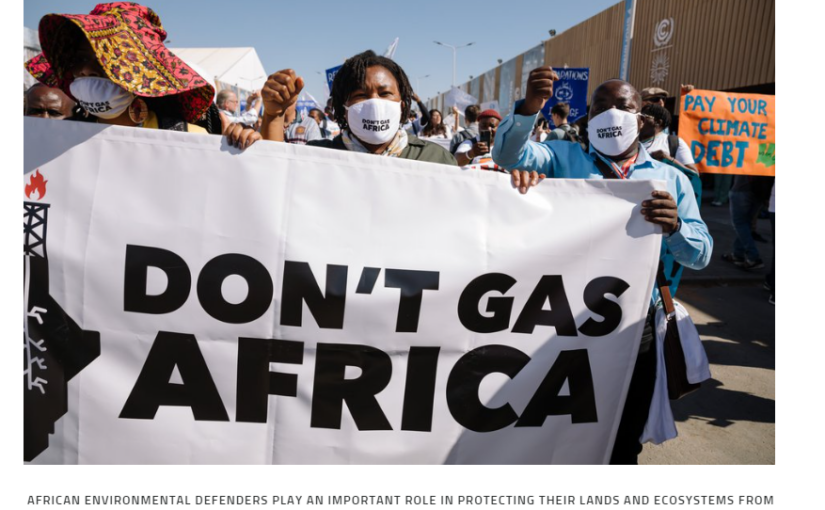Karabo Mokgonyana is a Legal and Development Practitioner focusing on human rights protection, effective implementation of international law and climate, peace and security. In this blog, Karabo reflects on the key themes discussed in her paper presentation at the Worldwide Universities Network (WUN) funded workshop on Gender, Climate Change and Natural Resource Extraction, co-organised by the IGDC in July 2024.
In East and Southern Africa, women are playing a vital role in defending the environment against the encroachment of extractive industries and multinational corporations. These women, often referred to as feminist environmental defenders, are leading movements to protect their communities, natural resources, and traditional ways of life. They are standing up against harmful practices, from mining and oil drilling to the construction of mega-projects that threaten indigenous lands. This blog explores their efforts through four case studies, illustrating how these women are not only fighting for the environment but also promoting a more inclusive and sustainable approach to development.
1. Shell Seismic Survey Movement in South Africa

Photo credit: Marie Jacquemin/Greenpeace via Global Witness
One of the most prominent environmental battles in recent years has been the opposition to Shell’s seismic survey project along South Africa’s Wild Coast. Shell planned to explore oil and gas reserves off the coast by using seismic testing, which involves emitting loud blasts of sound into the ocean floor to detect potential fossil fuel deposits. However, this project posed significant risks to marine life and the livelihoods of coastal communities dependent on fishing and tourism.
Women have been at the forefront of the movement against this project, mobilising local communities to protect their marine environment. They organised awareness campaigns, educational workshops, and protests to highlight the dangers of seismic testing. These women argued that the project would not only harm marine biodiversity but also disrupt the livelihoods of those who rely on the ocean for their income. Their efforts have drawn attention to the broader issues of environmental justice and corporate accountability, emphasising the need for sustainable development that respects both nature and local communities.
2. Amazon’s Africa Headquarters on Indigenous Land
In Cape Town, South Africa, the construction of Amazon’s Africa headquarters sparked a significant controversy due to its location on land that holds deep cultural and historical significance for the Khoi and San people, the region’s indigenous inhabitants. The chosen site was the battleground of a historic conflict between these indigenous groups and European settlers. The project threatened to erase this important cultural heritage and further marginalised the Khoi and San communities.
Women within these communities have been vocal in their opposition to the project, advocating for the preservation of their cultural heritage and the protection of their ancestral lands. They organised cultural events, storytelling sessions, and legal challenges to raise awareness about the significance of the site and to demand that their rights be respected. Their activism underscores the importance of recognizing and protecting indigenous rights in the face of large-scale development projects that prioritise corporate interests over cultural and environmental preservation.
3. Total’s Crude Oil Pipeline Between Uganda and Tanzania
The East African Crude Oil Pipeline (EACOP), a massive infrastructure project led by the French oil company Total, aims to transport crude oil from Uganda’s Lake Albert Basin to the Tanzanian coast for export. While the project promises economic benefits, it also poses severe environmental and social risks, including the displacement of communities, pollution of water sources, and harm to biodiversity.
Women in affected communities, particularly those along the pipeline route, have been at the forefront of the StopEACOP movement. They have mobilised against the destruction of local ecosystems, organised tree-planting initiatives, and documented environmental changes caused by the project’s construction. These women are not only advocating for the protection of their environment but also for the rights of their communities to participate in decisions that affect their lives. They emphasise the need for sustainable development that prioritises the well-being of people and the planet over short-term economic gains.
4. Oil Drilling in the Okavango Delta by RECON Africa
The Okavango Delta, a UNESCO World Heritage site shared by Botswana and Namibia, is one of Africa’s most biodiverse regions. However, it is currently under threat from oil drilling by RECON Africa, a Canadian oil company. The project has raised significant concerns about the potential impacts on the delta’s delicate ecosystem, which supports a wide variety of wildlife and is a crucial water source for local communities.
Women in the region have taken a stand against the oil drilling, organising protests, and working with environmental NGOs to monitor the project’s impacts. They argue that the risks to the environment and their communities far outweigh any potential economic benefits. These women are advocating for the protection of the delta as a vital natural resource that supports both biodiversity and human livelihoods. Their activism highlights the need for a more sustainable approach to development that prioritises environmental conservation and community resilience.
The Importance of Feminist Perspectives in Environmental Activism

The efforts of these women environmental defenders are grounded in a feminist perspective that emphasises inclusivity, community involvement, and the intersectionality of social and environmental issues. They recognize that environmental degradation disproportionately affects marginalised groups, including women, indigenous peoples, and rural communities. As such, their activism is not just about protecting the environment but also about promoting social justice and human rights.
One of the key strengths of feminist environmental activism is its communal approach to movement building. These women work to bring together diverse stakeholders, including local communities, environmental organisations, and legal experts, to create broad-based coalitions that can effectively challenge powerful corporate interests. This inclusive approach ensures that the voices of those most affected by environmental degradation are heard and that their rights are respected.
However, the work of feminist environmental defenders is not without its challenges. In many cases, their activism comes at a high cost. Women who stand up to powerful corporations and government policies often face physical violence, imprisonment, threats, and even assassination. Despite these risks, they continue to fight for their communities and the environment, driven by a deep commitment to justice and sustainability.
The case studies from East and Southern Africa illustrate the critical role that women play in defending the environment and promoting sustainable development. Their activism is grounded in a feminist perspective that prioritises inclusivity, social justice, and the protection of both people and nature. As these women continue to lead the fight against extractive industries and harmful development projects, they are not only protecting their communities and natural resources but also shaping a more just and sustainable future for all. Their work underscores the importance of feminist perspectives in environmental activism and the need for a collective approach to movement building that values the voices and rights of all people.

